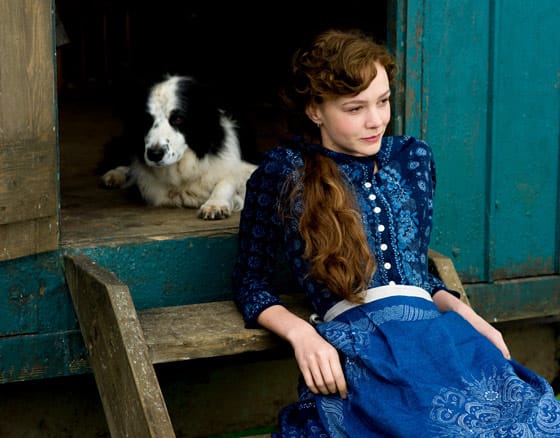Thomas Hardy's Far From the Madding Crowd is no stranger to the silver screen; the Victorian novel has been adapted four times between 1915 and now. Still, director Thomas Vinterberg manages to make this straight-laced adaptation completely his own, bringing the same mood and stark-yet-beautiful scene selection he brought to 2012's The Hunt to this classic and world-renowned romantic drama.
Far From the Madding Crowd chiefly concerns itself with Bathsheba Everdene (played here by the consistently captivating and criminally underrated Carey Mulligan), an educated and headstrong woman who finds herself in a unique position after inheriting her uncle's farm and entire estate: she no longer requires anybody to support her (at least financially speaking). Nevertheless, after taking over the property, Everdene is confronted by three suitors looking for love: William Boldwood (Michael Sheen), a mature and un-romantic man who, at first glance, seems unable to tell the difference between true love and good business (his big proposal pitch involves them merging their farms); Sergeant Troy (Tom Sturridge), a handsome and merciless military member with a hidden past; and Gabriel Oak (Matthias Schoenaerts), a lowly sheep farmer fallen on hard times who, although having his initial proposal rebuffed by Everdene previously in his life, takes a job on her farm seemingly to be closer to her.
The story rolls out the way one would probably expect from a narrative that was once a monthly serialized drama (albeit with a pretty unique role reversal not widely seen at the time), but Vinterberg's adaptation manages to make this thoughtful character drama even more complex by emphasizing the stiltedness of the period's gender stereotypes, and even making the story's most Sunday-afternoon-soap-moments seem like art-house fairy-tale dream sequences (the thinly veiled and phallic sword scene in the woods being a clear standout).
Unlike most modern romances depicted on camera, Everdene isn't looking for a mate to fill a particular void in her life or enhance some other aspect; she has the financial means to fully support herself and stand by her decisions, as well as the confidence and courage to carry them out. Instead, each of the film's three male leads are looking to her to improve their own lives, for noble and ignoble reasons. (Sturridge, whose character consistently looks like the Big Bad Wolf hiding underneath Little Red Riding Hood's clothes, is perhaps the most detestable yet watchable here, as the British actor makes even his character's most manic and ruthless moments seem premeditated and reasonable.)
For those accustomed to Victorian novels or the source material itself, the story can be rather predictable (especially its cathartic ending, which, given the film's overall ominous tone, would seem like a major movie company's shitty suggestion if it wasn't already written in the book), but Vinterberg's adaptation is clearly of higher quality than its forebears. The story offers a unique perspective on romantic relationships, pride and pastoral living, and its cast execute it exquisitely.
(Searchlight Pictures)Far From the Madding Crowd chiefly concerns itself with Bathsheba Everdene (played here by the consistently captivating and criminally underrated Carey Mulligan), an educated and headstrong woman who finds herself in a unique position after inheriting her uncle's farm and entire estate: she no longer requires anybody to support her (at least financially speaking). Nevertheless, after taking over the property, Everdene is confronted by three suitors looking for love: William Boldwood (Michael Sheen), a mature and un-romantic man who, at first glance, seems unable to tell the difference between true love and good business (his big proposal pitch involves them merging their farms); Sergeant Troy (Tom Sturridge), a handsome and merciless military member with a hidden past; and Gabriel Oak (Matthias Schoenaerts), a lowly sheep farmer fallen on hard times who, although having his initial proposal rebuffed by Everdene previously in his life, takes a job on her farm seemingly to be closer to her.
The story rolls out the way one would probably expect from a narrative that was once a monthly serialized drama (albeit with a pretty unique role reversal not widely seen at the time), but Vinterberg's adaptation manages to make this thoughtful character drama even more complex by emphasizing the stiltedness of the period's gender stereotypes, and even making the story's most Sunday-afternoon-soap-moments seem like art-house fairy-tale dream sequences (the thinly veiled and phallic sword scene in the woods being a clear standout).
Unlike most modern romances depicted on camera, Everdene isn't looking for a mate to fill a particular void in her life or enhance some other aspect; she has the financial means to fully support herself and stand by her decisions, as well as the confidence and courage to carry them out. Instead, each of the film's three male leads are looking to her to improve their own lives, for noble and ignoble reasons. (Sturridge, whose character consistently looks like the Big Bad Wolf hiding underneath Little Red Riding Hood's clothes, is perhaps the most detestable yet watchable here, as the British actor makes even his character's most manic and ruthless moments seem premeditated and reasonable.)
For those accustomed to Victorian novels or the source material itself, the story can be rather predictable (especially its cathartic ending, which, given the film's overall ominous tone, would seem like a major movie company's shitty suggestion if it wasn't already written in the book), but Vinterberg's adaptation is clearly of higher quality than its forebears. The story offers a unique perspective on romantic relationships, pride and pastoral living, and its cast execute it exquisitely.
